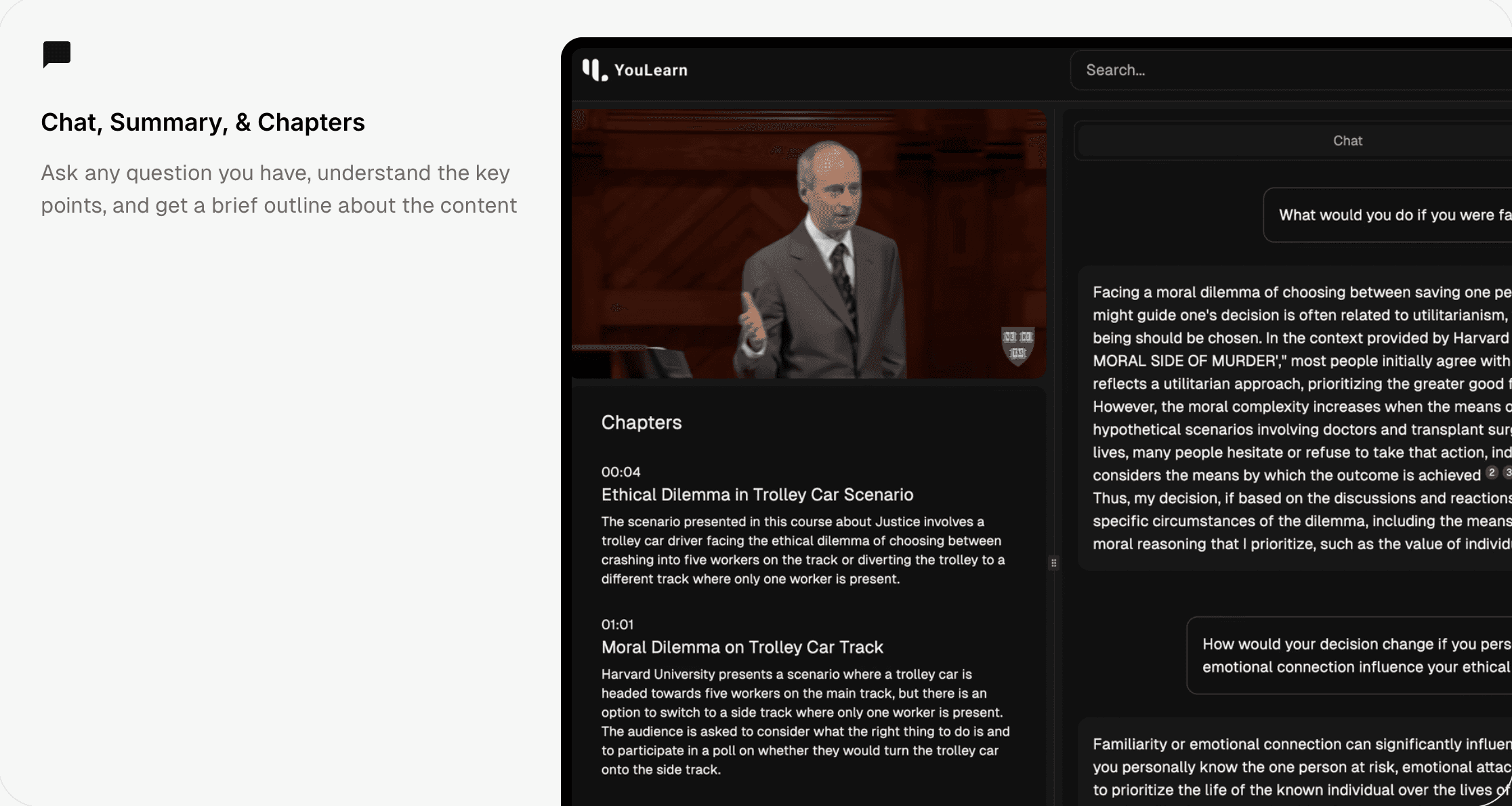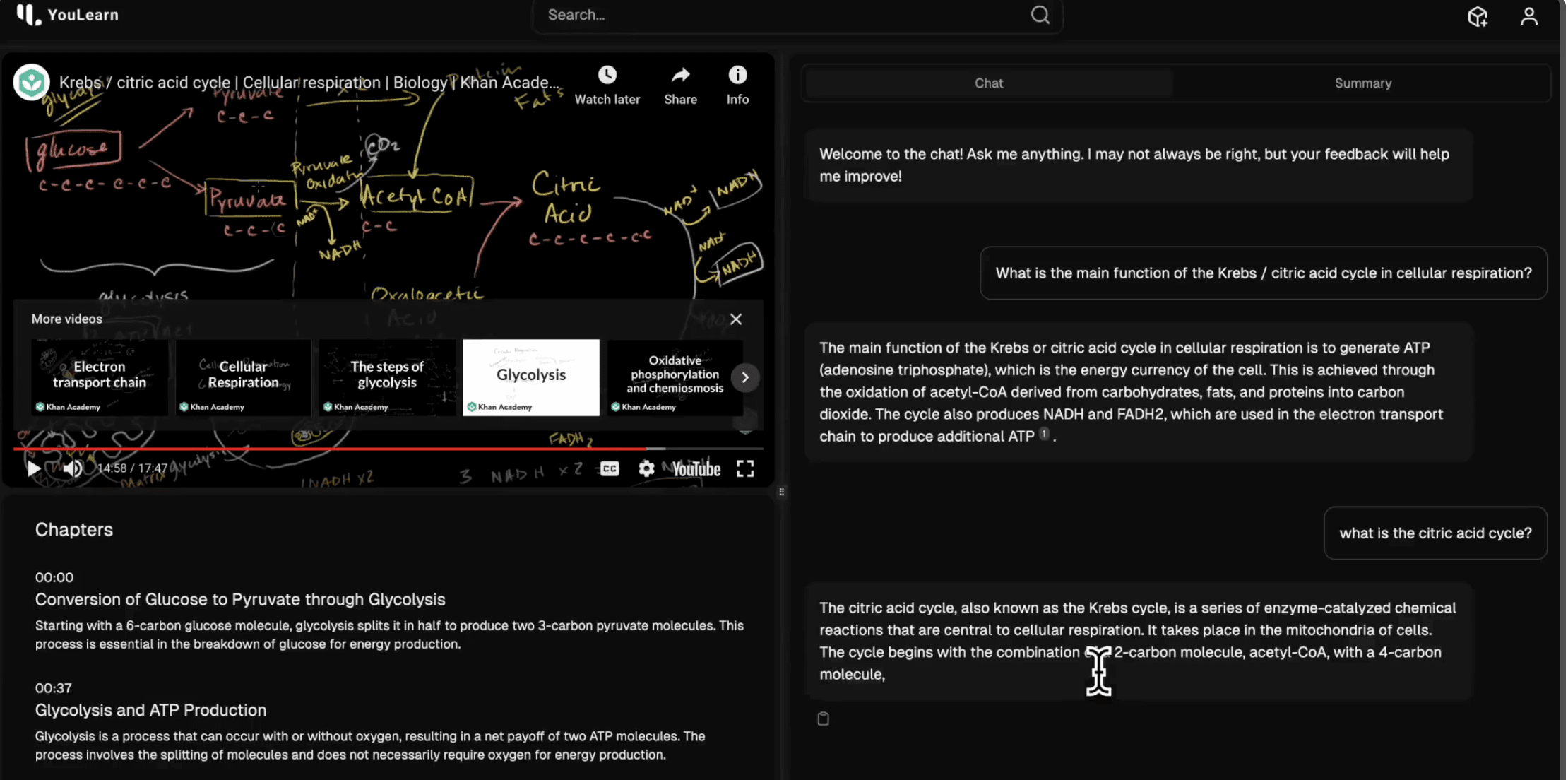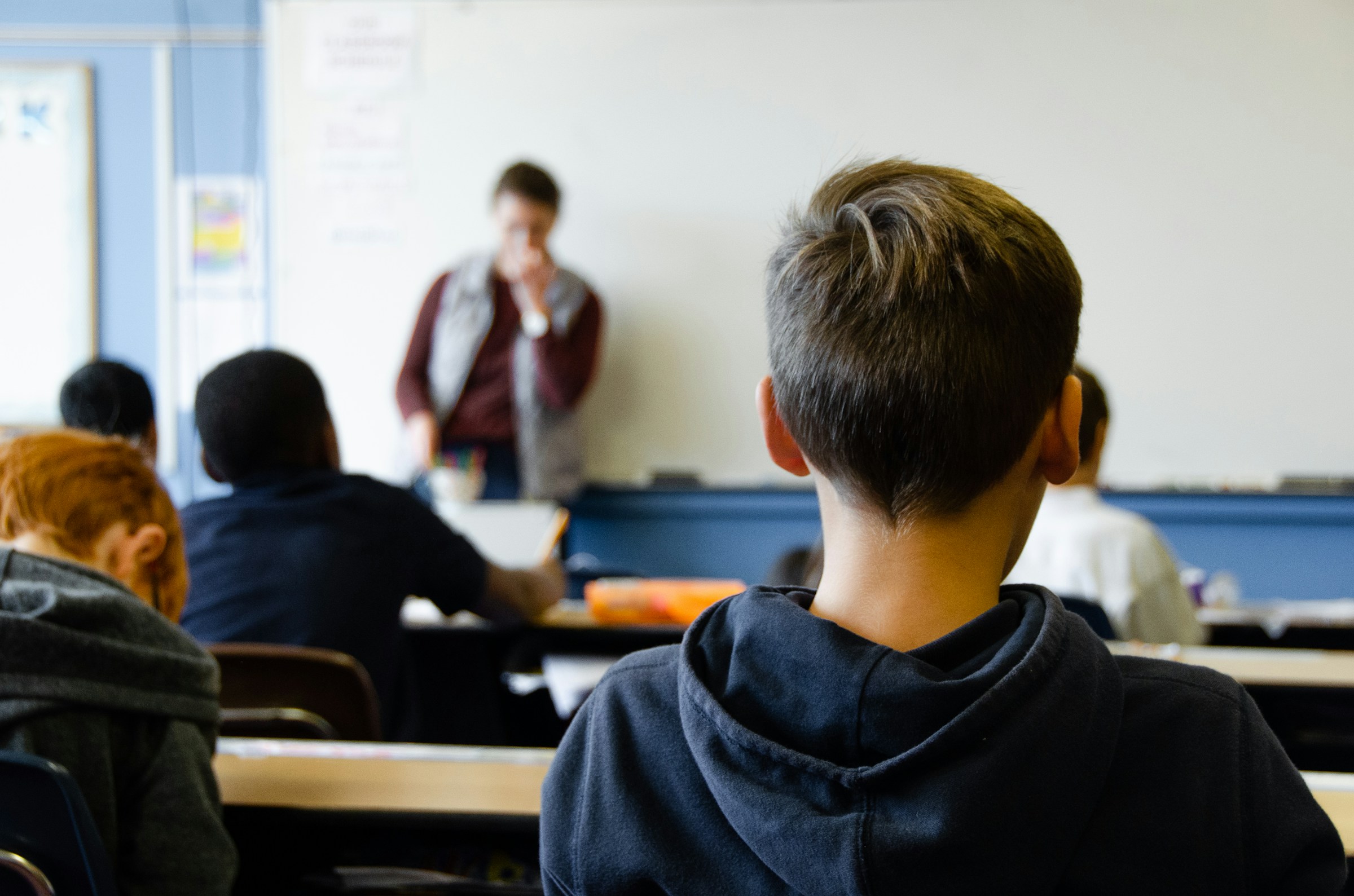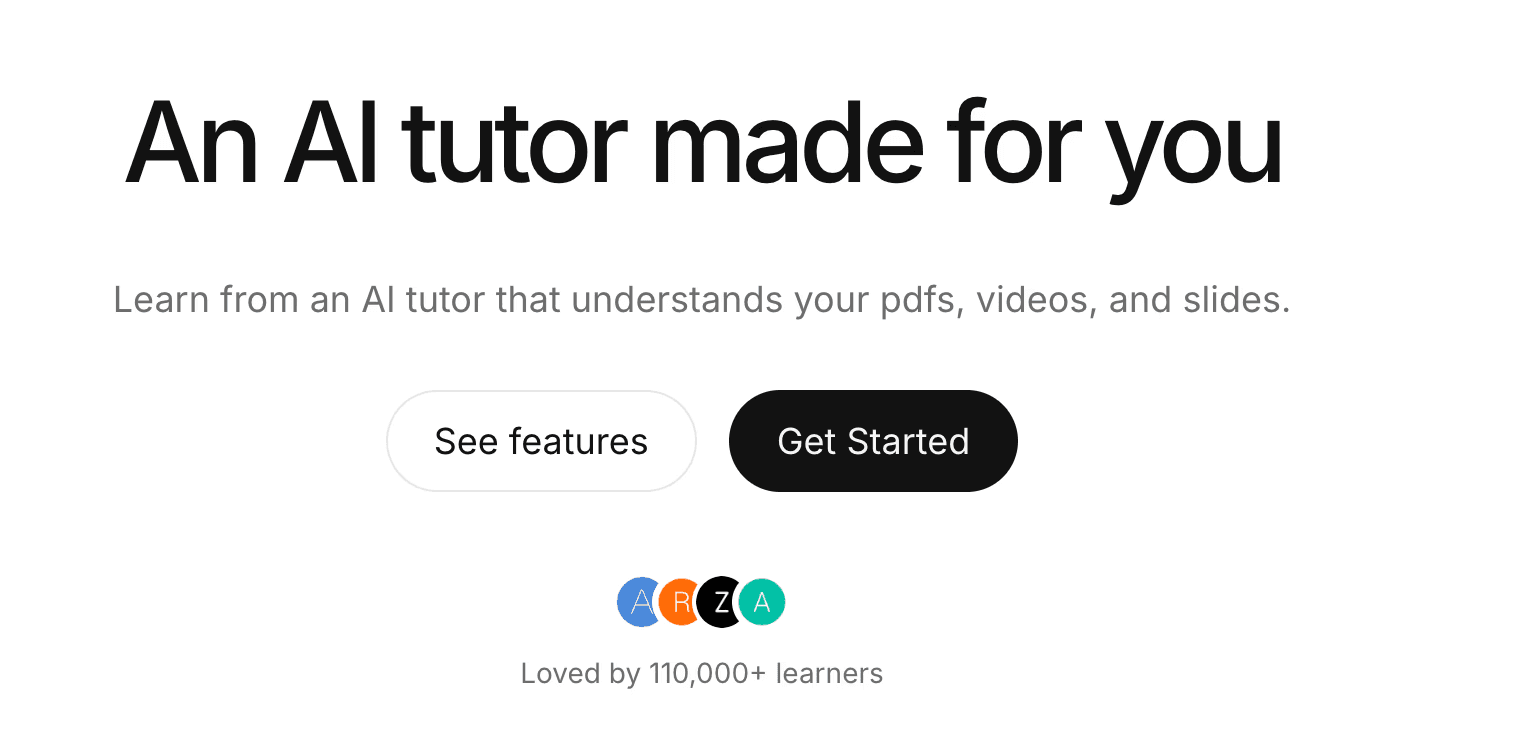12 Effective Study Strategies For High School Students
Sep 25, 2024

YouLearn Team
For many high school students, the word “study” brings on a wave of anxiety. Thoughts of long hours spent pouring over endless notes and textbooks fill their heads, and they want to do anything but get started. However, studying doesn’t have to be such a chore. In fact, with the right study strategies, students can reduce anxiety, retain more information, and even improve their grades.
This guide will explore how to be a better student with effective study strategies for high school students. We’ll also discuss how personalized learning through AI can improve study sessions and help students reach their academic goals.
One way to access personalized learning is with YouLearn’s personal AI tutor. This innovative tool helps students target their unique learning needs to improve study sessions and achieve their academic goals.
Table of Contents
Which Strategy Is Best For Studying?

Reading is not studying. Just re-reading texts or notes isn't actively engaging with the material. Only doing the readings for class isn’t studying; it’s just doing the reading for class. Re-reading leads to quick forgetting. Reading is essential in pre-studying, but learning information requires actively engaging with the material (Edwards, 2014). Active engagement is constructing meaning from text that involves connecting to lectures, forming examples, and regulating your learning (Davis, 2007).
Active studying doesn’t mean highlighting or underlining text, re-reading, or rote memorization. Though these activities may help keep you engaged in the task, they’re not considered active studying techniques and are weakly related to improved learning (Mackenzie, 1994). Ideas for active studying include:
Create a Topic-Based Study Guide
Organize your materials into a study guide by topic. As you go, formulate questions and problems and write complete answers. This will help you learn the material and create your quiz.
Be the Teacher
Become a teacher. Say the information aloud in your own words as if you are the instructor and teaching the concepts to a class.
Relate the Material to Your Life
Derive examples that relate to your own experiences. This will help make the material more meaningful so you can remember it more easily.
Create Concept Maps
Create concept maps or diagrams that explain the material. Visual aids help organize information and show relationships between concepts.
Develop Your Symbols
Develop symbols that represent concepts. This can help you remember the material more easily.
Look for Big Ideas in Non-Technical Courses
For non-technical classes (e.g., English, History, Psychology), figure out the big ideas so you can explain, contrast, and re-evaluate them.
Work Technical Problems
For technical classes, work on the problems and explain the steps and why they work.
Study in Terms of Questions and Answers
Study in terms of question, evidence, and conclusion: What is the question posed by the instructor/author? What is the evidence that they present? What is the conclusion?
Organize Your Study Sessions
Organization and planning will help you actively study for your courses. When studying for a test, organize your materials first and begin actively reviewing by topic (Newport, 2007). Often, professors provide subtopics on the syllabi. Use them as a guide to help organize your materials. For example, gather all the materials for one topic (e.g., PowerPoint notes, textbook notes, articles, homework, etc.) and put them together in a pile. Label each pile with the topic and study by topic.
Understand the Study Cycle
The Study Cycle, developed by Frank Christ, breaks down the different parts of studying: previewing, attending class, reviewing, studying, and checking your understanding. Although each step may seem obvious, students often try to take shortcuts and miss opportunities for good learning.
For example, you may skip a reading before class because the professor covers the same material in class; doing so misses a pivotal opportunity to learn in different modes (reading and listening) and to benefit from the repetition and distributed practice (see #3 below) that you’ll get from both reading ahead and attending class. Understanding the importance of all stages of this cycle will help ensure you don’t miss opportunities to learn effectively.
Spacing Out is Good
One of the most impactful learning strategies is “distributed practice”—spacing out your studying over several short periods over several days and weeks (Newport, 2007). The most effective practice is working a short time on each class daily. The total amount of time spent studying will be the same (or less) than one or two marathon library sessions, but you will learn the information more deeply and retain much more for the long term—which will help get you an A on the final. The important thing is how you use your study time, not how long you study. Long study sessions lead to a lack of concentration and, thus, a lack of learning and retention.
You need control over your schedule to spread out studying over short periods across several days and weeks. Keeping a list of tasks to complete daily will help you to include regular active studying sessions for each class. Try to do something for each class each day. Be specific and realistic regarding how long you plan to spend on each task—you should not have more tasks on your list than you can reasonably complete during the day. In addition to learning the material more deeply, spacing out your work helps stave off procrastination.
Rather than facing the dreaded project for four hours on Monday, you can face the dreaded project for 30 minutes each day. The shorter, more consistent time to work on a dreaded project will likely be more acceptable and less likely to be delayed to the last minute. Finally, you must memorize class material (names, dates, formulas). In that case, making flashcards for this material and reviewing them periodically throughout the day rather than one long memorization session (Wissman and Rawson, 2012).
It’s Good to be Intense
Not all studying is equal. You will accomplish more if you study intensively. Intensive study sessions are short and will allow you to finish work with minimal wasted effort. Shorter, intensive study times are more effective than drawn-out studying.
One of the most impactful study strategies is distributing studying over multiple sessions (Newport, 2007). Intensive study sessions can last 30 or 45-minute sessions and include active studying strategies. For example, self-testing is an active study strategy that improves studying intensity and learning efficiency. However, planning to spend hours on end self-testing is likely to cause you to become distracted and lose your attention.
On the other hand, if you plan to quiz yourself on the course material for 45 minutes and then take a break, you are much more likely to maintain your attention and retain the information. Furthermore, the shorter, more intense sessions will likely put the pressure on that is needed to prevent procrastination.
Silence Isn't Golden
Know where you study best. The silence of a library may not be the best place for you. It’s important to consider what noise environment works best for you. You might find that you concentrate better with some background noise. Some people find studying while listening to classical music helps them focus, while others find this highly distracting.
The library's silence may be just as distracting (or more) than the noise of a gymnasium. Thus, if silence is distracting, but you prefer to study in the library, try the first or second floors where there is more background ‘buzz.’ Remember that active studying is rarely silent, requiring saying the material aloud.
Problems are Your Friend
Working and reworking problems is essential for technical courses (e.g., math and economics). You must also be able to explain the steps of the problems and why they work.
In technical courses, working on problems is usually more critical than reading the text (Newport, 2007). In class, write down the practice problems demonstrated by the professor in detail. Annotate each step and ask questions if you need clarification. At the very least, record the question and the answer (even if you miss the steps).
Compile a list of problems from the course materials and lectures when preparing for tests. Work the issues and explain the steps and why they work (Carrier, 2003).
Reconsider Multitasking
Much research indicates that multi-tasking does not improve efficiency and negatively affects results (Junco, 2012).
To study smarter, not more complex, you will need to eliminate distractions during your study sessions. Social media, web browsing, game playing, texting, etc., will severely affect the intensity of your study sessions if you allow them! Research shows that multitasking (e.g., responding to texts while studying) increases the time needed to learn the material and decreases the quality of the learning (Junco, 2012).
Eliminating distractions will allow you to engage fully during your study sessions. If you don’t need your computer for homework, don’t use it. Use apps to help you limit the amount of time you can spend at specific sites during the day. Turn your phone off. Reward intensive studying with a social-media break (but make sure you time your break!)
Switch Up Your Setting
Find several places to study on and around campus and change your space if it is no longer suitable.
Know when and where you study best. Your focus at 10:00 PM may not be as sharp as at 10:00 AM. Perhaps you are more productive at a coffee shop with background noise or in the study lounge in your residence hall. When you study on your bed, you fall asleep.
Have a variety of places in and around campus that are suitable study environments for you. That way, you can find your perfect study spot wherever you are. After a while, you might find that your spot is too comfortable and no longer an excellent place to study, so it’s time to hop to a new spot!
Become a Teacher
Explain the material in your own words, as if you are the teacher. You can do this in a study group, with a partner, or alone. Saying the material aloud will point out where you are confused and need more information and will help you retain the information. As you explain the material, use examples and connect concepts (just as a teacher does). It is okay (even encouraged) to do this with your notes in your hands.
At first, you may need to rely on your notes to explain the material, but eventually, you can teach it without your notes. Creating a quiz for yourself will help you to think like your professor. What does your professor want you to know? Quizzing yourself is a highly effective study technique. Make a study guide and carry it with you to review the questions and answers periodically throughout the day and several days.
Identify the questions you don’t know and quiz me on only those questions. Say your answers aloud. This will help me to retain the information and make corrections where needed. Do the sample problems for technical courses and explain how I got from the question to the answer. Re-do the issues that give me trouble. Learning the material in this way actively engages your brain and will significantly improve your memory (Craik, 1975).
What Is The Best Thing To Study In High School?

Mastering English (Language Arts) to Succeed in School and Life
You should take English every year. Traditional courses, such as American and English literature, help improve your writing skills, reading comprehension, and vocabulary.
Math: The Key to College Admission Tests
Algebra and geometry help you succeed on admission tests and in college math classes. Take them early to have time for advanced science and math, showing colleges that you're ready for higher-level work. Most colleges want students with three years of high school math. The more competitive colleges prefer four years. Take some combination of the following: Algebra I, Algebra II, Geometry, Trigonometry, Precalculus, Calculus.
Science: Analytical Thinking for College and Life
Science teaches you how to think analytically and apply theories to reality. Colleges want to see you've taken at least three years of laboratory science classes. A good combination includes a year of Biology, Chemistry or physics, Earth or physical science. Competitive schools expect four years of lab science courses, which you may be able to get by taking advanced classes in these same areas.
Social Studies: Understanding the World for College and Beyond
Improve your understanding of local and world events by studying the cultures and history that helped shape them. Here’s a suggested high school course plan: U.S. History, U.S. Government, World History and Geography, and Economics.
Foreign Languages: Stretching Your Mind for Future Learning
Studying a foreign language shows you're willing to stretch beyond the basics. Many colleges require at least two years of study in the same foreign language, while others prefer more.
The Arts: Strengthening Your Brain for Academic Learning
The arts help you recognize patterns, learn to notice differences and similarities and exercise your mind in unique ways. Some colleges require or recommend one or two semesters in the arts. Choices include studio art, dance, music, and drama.
Advanced College Courses: Preparing for Future Academic Rigor
Enroll in challenging high school courses, such as honors classes, AP courses, or IB program courses, to prepare for college-level work.
YouLearn's Your AI Tutor

YouLearn is your AI tutor, designed to supercharge your learning from YouTube videos, PDFs, and slides. Our AI chats with you about the content, provide quick summaries, and breaks information into digestible chapters. Whether you are a college student or a self-learner, we help you grasp material faster and more effectively.
Just upload your content, and our AI transforms it into an interactive learning experience. With YouLearn, you're set to learn more intelligently, not more complicated. Learn anything with ease for free today with YouLearn's personal AI tutor.
Related Reading
• How to Pass a Test
• How to Be a Good Student
• Back to School Tips
12 Effective Study Strategies For High School Students

1. Use You Learn AI
YouLearn is your AI tutor, designed to supercharge your learning from YouTube videos, PDFs, and slides. Our AI chats with you about the content, provide quick summaries, and breaks information into digestible chapters. Whether you are a college student or a self-learner, we help you grasp material faster and more effectively.
Just upload your content, and our AI transforms it into an interactive learning experience. With YouLearn, you're set to learn more intelligently, not more complicated. Learn anything with ease for free today with YouLearn's personal AI tutor.

2. Before You Study, Schedule Your Time
Plan to study for about two hours each dedicated study night, five nights per week. It helps to schedule your time by writing down your study goals at the beginning of the week and then estimating how much each task will take. You should also assess the urgency of each task and schedule more urgent tasks for the beginning of the week. Study at a set time. Establishing a study habit is extremely important for developing good study skills.
Knowing when you will study keeps you from committing to conflicting activities or wasting time deciding when to study, getting material together, etc. Study in a setting similar to the testing environment. Try to study at a desk with little or no distractions. You might want to turn off your music and all other noises. Feeling like you’re in a familiar setting when you take a test will also help you recall information.
3. Spaced Repetition
One of the most critical study techniques to remember is spaced repetition. Rather than cramming everything into one study session, spacing out your learning over some time can help reinforce your understanding of the material and improve your retention. You can achieve this by breaking your study sessions into shorter, more frequent sessions over a few days or weeks before an exam.
4. Learn The Tricks for Efficient Note-Taking
The more comprehensive, legible, and organized your notes are, the easier it will be for you to study them. Notes can increase your recall of important information and highlight essential topics or ideas you need to revisit. Create your bullet system using different numbers (Arabic, Roman) or symbols to mark your notes. For example, I use a star for points I’d like to return to, an exclamation mark for points I plan to put on flashcards, or a smiley face for concepts I’d like my teacher to re-explain.
Shorten your notes by using abbreviations and symbols. You don’t need to write out every word. If I know, I’ll remember what something shorter means. Save yourself some time! Feel free to get creative. Draw pictures, thought bubbles, or anything that pulls your attention to important topics. Draw arrows from the cause to the effect. Use different colored highlighters. Mind mapping is a great technique to help visually organize the information I need to study.
5. Active Recall
This technique involves testing yourself on the material you’ve learned rather than just re-reading it. Examples of active recall include flashcards, practice questions, and quizzes. By actively engaging with the material, you’ll be able to identify areas where you need to focus your attention and improve your understanding of the concepts.
6. Use Your Study Time Wisely
Setting a schedule and your study topic priorities is a good start, but be ready to follow through by maintaining focus when it’s time to crack the books. First, make a conscious effort to stay away from distracting websites that can suck up your day. If you have trouble with this, you can download an app to shut out distracting websites, like SelfControl for Mac users.
Don’t study before bedtime or when you know you will not be fully committed or awake. If you can, give yourself some daylight hours to study. Sitting in the sun can help keep you awake and alert if it's nice and won't distract you. Take frequent breaks. Learn your body’s natural rhythm and understand how long it takes to return to the zone.
If it’s easy for you to return to your studies, take a 5-minute break every half hour. If refocus takes a while, you may be better off taking a 30-minute break every hour and a half. Avoid multitasking. Trying to take on multiple tasks at once can weaken your grasp of information, reduce your memory, and hurt your performance overall. Reducing distractions as much as possible and ensuring I solely focus on one topic are proper study methods for high school. It helps to let everyone I live with know I need quiet time or go to a library or quiet study location.
7. Interleaving
Interleaving is another effective technique. This involves mixing up different topics or problems during a study session. For example, if I’m studying for a history exam, I could alternate between studying different historical events rather than just focusing on one topic at a time. This technique helps to strengthen connections between various pieces of information and improve retention.
8. Use Creative Study Tools
If I can add enjoyment or entertainment to my study sessions, I’ll be more motivated to start and stick to it each night. Turn your notes into flashcards. Flashcards challenge you to remember facts I’ve covered and reward you by hammering these concepts into your brain. As you review your notes, mark any terms or topics you struggle with or require extra understanding or memorization.
Make flashcards from 3x5 cards, or search for one of the many free apps online for making digital flashcards and try it. Visualize challenging concepts by turning them into pictures or stories. This is helpful for reading comprehension, so as I read about different ideas and topics, I pull out specific words or phrases and connect them to a picture in my mind, a memory, or a story. This will also help me recall the information when associating it with the story or visual later. Study with friends. While it’s crucial to concentrate on solo study sessions, mix things up by arranging a weekly study group.
I’ll get new perspectives on the material as others discuss their takeaways from it. Just make sure that your friends are interested in developing good study skills. This doesn’t mean I shouldn’t have fun studying together, but it is a work session. It’s best to discuss what’s expected of one another and start with a single, focused study topic to see how well we do as a group.
9. Elaboration
Elaboration is another technique that can help me retain information. This involves expanding upon the information I’ve learned by connecting it to other knowledge, asking questions, and explaining concepts in my own words. By elaborating on what I’ve learned, I’ll be able to understand the material better and retain it more effectively.
10. Keep Yourself Healthy
I can’t be on my “A” game if I don’t care for myself. Being tired, hungry, or worked up can adversely affect my focus and ability to remember information. Make sure I am getting enough sleep! According to multiple studies, only about 30 percent of teens report getting the 8–10 hours of sleep they should get each night. Make sure I’m one of them, if possible. Turn off screens at least an hour before bedtime, and be conscious of winding down for the night. Don’t try to stress and study right before bed. If there are tasks I didn’t get to during the day, make a list for tomorrow rather than worrying about them all night. Get vitamins and nutrients, and avoid junk food.
Reward my body and mind for all my hard work by eating foods that will boost my energy and keep my mind and body going. Try things like walnuts, berries, leafy greens, and whole grains. Here are some other nutrient-dense foods to include in my diet daily. Now that I’m armed with these five approaches to study methods for high school success, I can drill down with these tips based on how my brain and body work.
11. Using Visual Aids
Visual aids can also be a helpful study technique. Diagrams, mind maps, and graphs can help me understand and remember complex information better. They can also help me organize information that makes sense to me and identify critical connections between different pieces of information.
12. Find A Study Buddy or Join a Study Group
One of the best ways to study is to share the experience with another person. Finding a study buddy or forming a study group with like-minded students can be beneficial. My study buddy/group can keep me motivated, help me stay accountable, quiz and test me on course material, read over my work, offer advice, share resources like textbooks, and lower expenses.
7 Mistakes To Avoid In High School

1. Neglecting Academics: The Unfortunate Reality of High School
Academic performance matters. It opens doors to college and career opportunities after graduation. It’s not uncommon for students to neglect academics, particularly during the middle and late high school years. They may get distracted by socialization and extracurricular activities, affecting grades and academic performance. Students should prioritize their schoolwork, attend classes, and complete assignments on time. A lack of effort and commitment can cause deficient grades and missed chances.
2. Procrastination: The Ultimate Buzzkill
Procrastination is a typical problem among high school students in Dehradun. If you delay tasks until the last minute, you may experience stress, anxiety, and unsatisfactory performance. It’s essential to manage time effectively, break tasks into smaller, manageable chunks, and avoid distractions to avoid procrastination.
3. Skipping Classes: Breaking Bad
Skipping classes is another common mistake that can have significant consequences. Classes can lead to missed assignments, good grades, and falling behind in coursework. Attending classes regularly, participating in class conversations, and pursuing aid when required is essential.
4. Not Getting Involved in Extracurricular Activities: Missing Out on the Good Stuff
Extracurricular activities are an essential part of high school life. They offer students opportunities to find their interests, form new skills, and make friends. Not getting involved in extracurricular activities can limit students' social and personal growth and reduce their chances of discovering their passions.
5. Lack of Communication with Teachers: The Silent Treatment
Effective communication with teachers is crucial for academic success. Many high school students in Dehradun make the mistake of not communicating with their teachers, leading to missed opportunities for help and support. It’s important to ask questions, seek clarification, and communicate concerns or challenges with teachers.
6. Failing to Plan for the Future: Living in the Here and Now
High school is a critical time for planning for the future. Failing to plan can limit opportunities for higher education and career prospects. It’s essential to research college and career options, attend college fairs, and seek advice from counselors to ensure a successful future.
7. Not Prioritizing Mental Health: The Pressure Cooker
Mental health is a vital element of a student’s well-being. High schools in Dehradun can be stressful and overwhelming, and many students make the mistake of not prioritizing their mental health. It’s essential to seek help, practice self-care, and maintain a healthy work-life balance.
Related Reading
• Tips for School
• How to Do Good in School
• Best Study Method
• College Study Tips
• Active Study Methods
How To Focus 100% In School

1. Brain Training: Get in the Zone
Sharpening your memory and concentration skills is like any other goal you might set for school: The more you practice, the better you’ll get. Playing certain types of games can help you get better at concentrating.
Try
Sudoku
Crossword puzzles
Chess
Jigsaw puzzles
Word searches or scrambles
Memory games
A 2015 study of 4,715 adults suggests that spending 15 minutes daily, five days a week, on brain training activities can improve concentration. Brain training games can also help develop your working and short-term memory, processing, and problem-solving skills.
Kids Brain training can work for kids, too. Invest in a book of word puzzles, complete a jigsaw puzzle together, or play a game of memory.
Even coloring can help improve concentration in children or adults. Older children may enjoy more detailed coloring pages, like those found in adult coloring books. The effects of brain training games may be significant for older adults since memory and concentration often tend to decline with age. Research from 2014 that looked at 2,832 older adults followed up on participants after ten years.
Older adults who completed 10 to 14 cognitive training sessions saw improved cognition, memory, and processing skills. After ten years, most study participants reported they could complete daily activities at least as well as they could at the beginning of the trial, if not better.
2. Level Up with Video Games
Brain games may not be the only games that can help improve concentration. Newer research also suggests that playing video games could help boost concentration. A 2018 study of 29 people found evidence to suggest that an hour of gaming could help improve visual selective attention (VSA). VSA refers to one's ability to concentrate on a specific task while ignoring distractions.
This study was limited by its small size, so these findings aren’t conclusive. The study also didn’t determine how long this increase in VSA lasted. Study authors recommend future research to continue exploring how video games can help increase brain activity and boost concentration.
A 2017 review examined 100 studies examining how video games could affect cognitive function. The results suggest that playing video games may lead to various changes in the brain, including increased attention and focus. This review had several limitations, including the fact that the studies focused on widely varying topics, including video game addiction and the possible effects of violent video games. Studies designed to explore video games' benefits support these findings.
3. Sleep Your Way to Better Focus
Sleep deprivation can easily disrupt concentration, not to mention other cognitive functions, such as memory and attention. Occasional sleep deprivation may not cause too many problems for you. But regularly failing to get a good night’s sleep can affect your mood and performance at work.
Being too tired can even slow down your reflexes and affect your ability to drive or do other daily tasks. A demanding schedule, health issues, and other factors sometimes make it difficult to get enough sleep. But getting as close to the recommended amount as possible on most nights is essential. Many experts recommend adults aim for 7 to 8 hours of sleep each night. Here are some tips for improving your quality of sleep:
Turn off the TV and put away screens an hour before bed.
Keep your room at a comfortable but relaxed temperature.
Wind down before bed with soft music, a warm bath, or a book.
Go to bed and get up around the same time each day, even on weekends.
Exercise regularly, but try to avoid a heavy workout just before bed.
4. Get Moving to Boost Brain Function
Increased concentration is among the many benefits of regular exercise, which benefits everyone. A 2018 study of 116 fifth-graders found evidence that daily physical activity could help improve concentration and attention after just four weeks.
Other research on older adults suggests that a year of moderate aerobic physical activity can help stop or even reverse memory loss related to brain atrophy. Do what you can. Experts recommend aerobic exercise, but doing what you can is better than doing nothing. You should exercise more or less depending on your fitness and weight goals.
Sometimes, it isn’t possible to get the recommended amount of exercise, especially if you live with physical or mental health challenges. If it’s hard to find time to exercise or you don’t want to join a gym, think of fun ways to work it in throughout the day. If you get your heart rate up, you’re exercising.
Ask Yourself
Can you walk your kids to school?
Can you get up 20 minutes earlier every morning to quickly jog around your neighborhood?
Can you split your weekly grocery trip into two or three visits by foot or bike?
Can you walk to the coffee shop instead of driving?
Try getting exercise right before you need to focus or when taking a mental break.
5. Explore the Great Outdoors
Try to get outside every day, even briefly, to boost your concentration naturally. Take a short walk through a park. Sitting in your garden or backyard can also help. Any natural environment has benefits. According to the American Psychological Association (APA), spending time in nature can positively impact physical and mental health.
Research from 2014 found evidence to suggest that including plants in office spaces helped increase concentration and productivity, workplace satisfaction, and air quality. Add a plant or two to your workspace or home for many positive benefits. Succulents make great choices for low-maintenance plants if you don’t have a green thumb. Kids benefit from natural environments, too.
Research published in 2017 followed over 1,000 children from birth to age 7. The study hoped to determine how lifelong exposure to trees and greenery at home or in the neighborhood might affect attention in children. The study suggests that natural environments could benefit brain development and improve attention in children. For children with ADHD, research suggests spending time in nature can:
Boost their mood
Help them think more clearly
increase their social interactions
Reduce symptoms of ADHD
6. Meditate for Better Focus
Meditation and mindfulness practices can offer multiple benefits, including improved concentration. A 2011 review of 23 studies found evidence to suggest that mindfulness training that emphasizes attention could help increase attention and focus. Mindfulness can also improve memory and other cognitive abilities.
Meditation doesn’t just mean sitting silently with your eyes closed. Yoga, deep breathing, and many other activities can help you meditate. If you’ve tried meditation and it hasn’t worked for you, or if you’ve never meditated before, this list can give you some ideas for getting started.
7. Take a Break for Better Focus
How can taking a break from work or homework increase your concentration? This idea might seem counterintuitive, but experts say it works. Consider this scenario: You’ve spent a few hours on the same project, and suddenly your attention wanders. Even though it’s hard to keep my mind on the task, you stay at your desk, forcing yourself to keep going. But your struggle to focus just makes me feel stressed and anxious about not completing my work on time.
You’ve probably been there before. Next time this happens, when you first feel your concentration drop, take a short mental break. Refresh with a cool drink or nutritious snack, take a quick walk, or get sun outside.
When you return to work, don’t be surprised if you feel more focused, motivated, or creative. Breaks can help boost these functions and more.
8. Listen to Music for Better Concentration
Turning on music while working or studying may help increase concentration, but this will depend on the individual. According to research, even if you don’t enjoy listening to music while you work, using nature sounds or white noise to mask background sounds could also help improve concentration and other brain functions.
Only some agree that music is helpful, especially when studying a challenging topic. If you do choose to listen to music, here are some tips:
Choose instrumental music rather than songs with lyrics
Keep the music at background noise level
Choose neutral music and avoid music you love or hate
Otherwise, playing music may be more distracting than not.
9. Eat Right for Better Brain Function
The foods you eat can affect cognitive functions like concentration and memory. Avoid processed foods, too much sugar, and greasy or fatty foods to boost concentration. Instead, try eating more of the following:
Fatty fish (think salmon and trout)
Eggs (white and yolk both)
Blueberries
Spinach
This list includes more brain foods. Staying hydrated can also positively impact concentration. Even mild dehydration can make it harder to focus or remember information. Eating breakfast can help by boosting your focus first thing in the morning. Aim for a meal low in added sugars and high in protein and fiber. Oatmeal, plain yogurt with fruit, and whole-grain toast with eggs are good breakfast choices.
10. Caffeine Can Help Improve Concentration
There’s no need to include caffeine in your diet if you prefer to avoid it, but research does suggest caffeine can benefit your attention and focus. Consider a cup of coffee or green tea if your concentration drops. A serving of dark chocolate 70 percent cacao or higher can have similar benefits if you don’t enjoy caffeinated beverages.
A 2017 study found evidence suggesting that phytochemicals naturally found in matcha, a type of green tea, improve cognitive function and help promote relaxation. So, matcha may be a good option if coffee makes you feel jittery or on edge.
Learn Anything With Ease for Free Today with YouLearn's Personal AI Tutor

YouLearn is your AI tutor designed to supercharge your learning from YouTube videos, PDFs, and slides. Our AI chats with you about the content provides quick summaries, and breaks information into digestible chapters. Whether you are a college student or a self-learner, we help you grasp material faster and more effectively.
Just upload your content, and our AI transforms it into an interactive learning experience. With YouLearn, you're set to learn more intelligently, not harder. Learn anything with ease for free today with YouLearn's personal AI tutor.
Related Reading
• High School Tips
• High School Study Skills
• How to Pass School
• How to Study Better in College
• How to Study by Yourself

